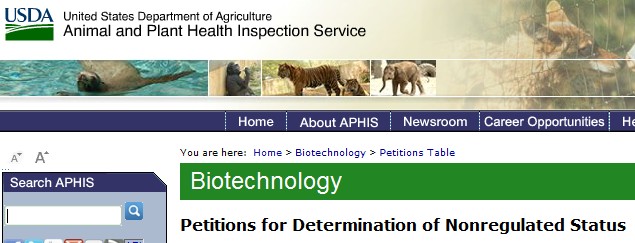U.S. Department of Agriculture (USDA) regulates GE products, protecting agriculture from potential plant pests including weeds. The USDA has jurisdiction over plant pests, plants, and veterinary products.
The U.S. Plant Protection Act (Title IV Public Law 106- 224, 114 Statute 438, 7 U.S.C. §7701–7772) requires the USDA to prevent the introduction and dissemination of plant pests into the United States and provides the specific authority to prohibit or restrict the importation, exportation, and interstate movement of plants, plant products, certain biological control organisms, noxious weeds, and plant pests.
APHIS is the primary regulatory arm of the USDA that deals with plants and crops.
APHIS is primarily involved with regulating specific GE organisms capable of posing risks to plant or animal health. It has an important role in biotechnology and the modification of living organisms through genetic engineering and the use of recombinant DNA technology.
APHIS regulations under 7 CFR §339.1
Any organism that has been altered or produced through genetic engineering is considered a regulated article if the donor organism, recipient organism, or vector or vector agent meets the definition of a plant pest, or is an unclassified organism and⁄or an organism whose classification is unknown, or any product that contains such an organism, or any other organism or product altered or produced through genetic engineering that the Administrator determines is a plant pest or has reason to believe is a plant pest.
APHIS defines plant pests broadly to include any organisms that can damage or cause injury to plants or plant parts. Since many plant pathogens are used as vectors or promoters in genetic engineering, they are considered plant pests.
APHIS regulation 7 CFR Part 339.6
Permits an applicant to petition APHIS to evaluate submitted data to determine that a particular regulated article does not present a plant pest risk and should no longer be regulated.
Once a developer has sufficient evidence that its GE organism does not pose more risks than the equivalent non-GE organism, the developer may petition APHIS for a determination of non-regulated status to introduce the GE organism into U.S. agriculture and commerce without oversight from APHIS (i.e., to become “deregulated”).
APHIS, at a minimum, prepares an Environmental Assessment (EA) and a “Determination of Non-Regulated Status” as well as considering comments from the public.
A list of Petitions of Non-regulated Status Granted or Pending by APHIS can be found at
